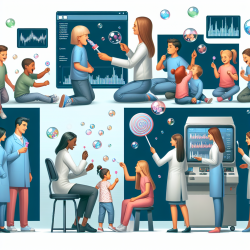Introduction
In the world of speech-language pathology, understanding the intricate interplay of genetics and environment is crucial for fostering optimal developmental outcomes in children. The recent research article titled "Five years of experience in the Epigenetics and Chromatin Clinic: what have we learned and where do we go from here?" provides invaluable insights into the role of epigenetics in developmental disorders. This blog explores how practitioners can leverage these findings to enhance their practice and improve outcomes for children.
Understanding the Impact of Epigenetics
The Epigenetics and Chromatin Clinic at Johns Hopkins has made significant strides in diagnosing and managing Mendelian disorders of the epigenetic machinery (MDEMs). These disorders, also known as Chromatinopathies, are characterized by intellectual disabilities and developmental delays. The clinic's comprehensive approach, which includes DNA sequencing and methylation profiling, has led to the discovery of new disorders and the development of novel therapeutic strategies.
Implications for Speech-Language Pathologists
For speech-language pathologists, the insights from this research can be transformative. Here are some ways practitioners can integrate these findings into their practice:
- Early Identification: Recognizing the signs of MDEMs, such as intellectual disabilities and developmental delays, can lead to earlier interventions. Speech-language pathologists should be aware of these signs and collaborate with geneticists for comprehensive assessments.
- Tailored Interventions: Understanding the genetic underpinnings of a child's developmental challenges allows for more personalized therapy plans. For instance, children with specific genetic mutations may benefit from targeted speech and language interventions.
- Collaboration with Multidisciplinary Teams: The success of the Epigenetics and Chromatin Clinic underscores the importance of a multidisciplinary approach. Speech-language pathologists should work closely with geneticists, neurologists, and other specialists to provide holistic care.
Encouraging Further Research
The findings from the Epigenetics and Chromatin Clinic highlight the need for ongoing research in the field of epigenetics and its impact on child development. Practitioners are encouraged to stay informed about the latest research and consider participating in studies that explore the intersection of genetics and speech-language pathology.
Conclusion
By integrating the insights from the Epigenetics and Chromatin Clinic into their practice, speech-language pathologists can enhance their ability to support children with developmental disorders. This research not only provides a deeper understanding of the genetic factors influencing development but also opens new avenues for targeted interventions and improved outcomes.
To read the original research paper, please follow this link: Five years of experience in the Epigenetics and Chromatin Clinic: what have we learned and where do we go from here?










